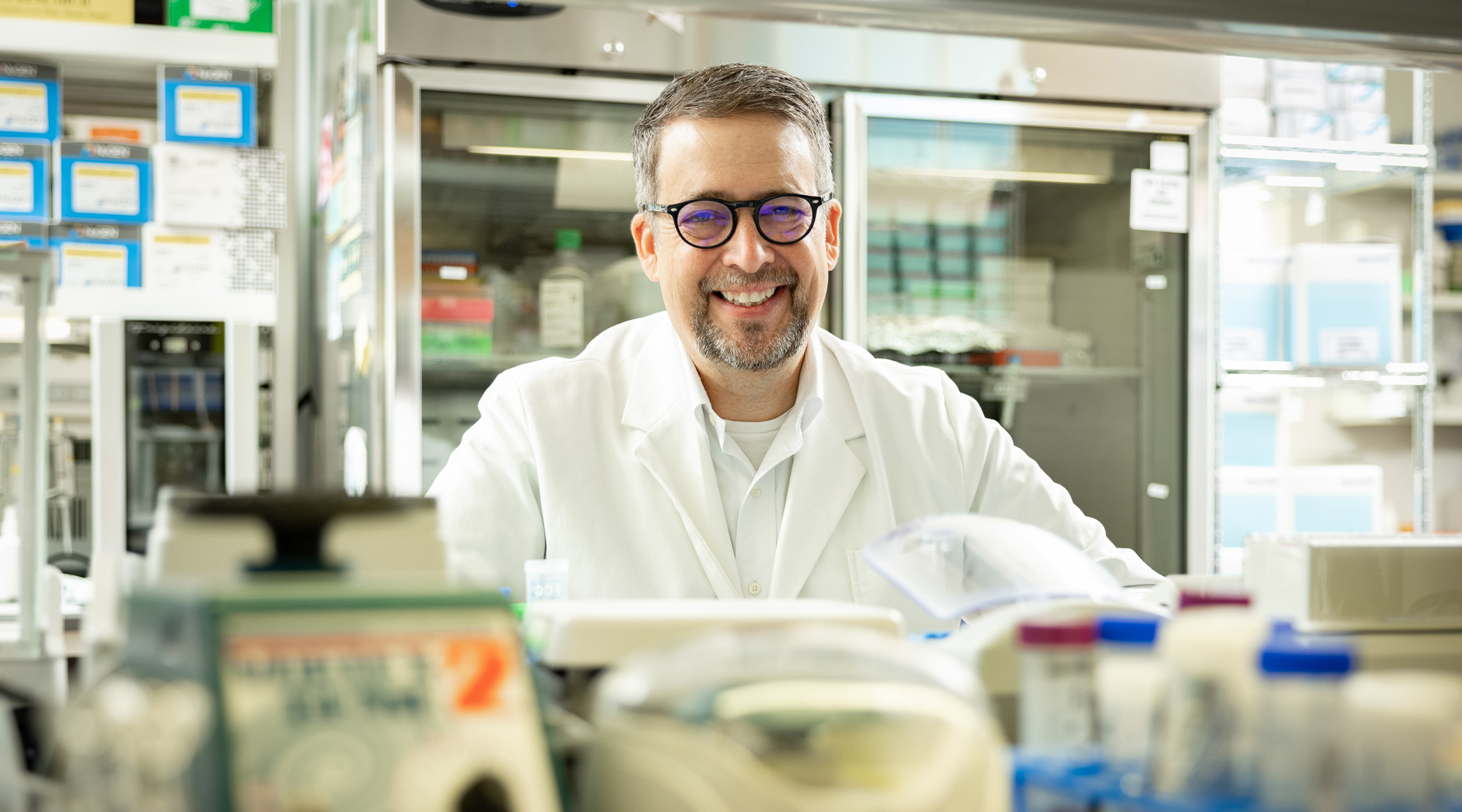Willard “Bill” Freeman, Ph.D.
Professor
Genes & Human Disease Research Program
My 101
My lab is focused on control of the genome in the brain, and other organs, with aging and disease. While you inherit your genes from your mother and father, how these genes are used is controlled, in part, by something called the epigenome. This epigenome is how your genome is organized and packaged in a cell with some parts being ready for use and other parts stored away. The human genome in every cell is about 6.5 ft long which means it has to be very organized in order to fit. We are characterizing how the brain epigenome changes with aging and the influences of sex, diet, and other environmental factors on how the epigenome changes. Working with other OMRF scientists we also study the retina, ovary, muscle, and other organs to maintain health.
The goal of this research is learning how to maintain a ‘youthful’ epigenome with aging as this could help prevent age-related diseases such as Alzheimer’s, Parkinson’s, and dementias.
Research
The central focus of our research is regulation of the genome through epigenetic mechanisms including how stimuli (e.g., heterochronic parabiosis, exercise, diet, early life adversity) cause persistent epigenome changes that effect cellular function throughout life. We use a combination of transgenic mouse approaches (NuTRAP), next generation sequencing, and bioinformatic methods to understand epigenetic processes within specific CNS cell populations (microglia, astrocytes, neurons). Similarly, we examine accumulation of mutations and deletions to the mitochondrial genome with aging and diabetes; pairing these measurements to assessments of mitochondrial function. Our scientific advances over the past decade in aging research have been: a) identifying that the majority of age-related CNS epigenomic changes are sexually divergent in mice and man; b) disproving the genomic hypomethylation with aging hypothesis; c)determining that, from a molecular neurobiology perspective, cognitive decline is associated with activation of specific pathways (e.g., Nogo signaling) and is not simply a more aged phenotype; d) identifying 100s of epigenomic aging clocks in humans of similar performance to existing clocks; e) developing a mouse models for paired epi/genomic, translatomic, and proteomic analysis of specific cell type. Our long-term goal is to mechanistically alter the epigenome to maintain healthy brain function and prevent the neuroinflammation with aging.
Brief CV
Education
B.A., Wake Forest University (English & Chemistry), Winston-Salem, NC, 1994
Ph.D., Wake Forest University School of Medicine (Pharmacology), Winston-Salem, NC, 2001
Post-Doctoral Fellow, Vollum Institute. Oregon Health Sciences University, Portland, OR
Post-Doctoral Fellow, Yerkes National Primate Research Center, Emory University, Atlanta, GA
Honors & Awards
National Research Council Public Policy Fellow, National Academy of Sciences, Washington, D.C., 1999
Pre-doctoral Training Fellow, NIDA, 1999-2001
Post-doctoral Training Fellow, NIDA, 2001-2004
Best poster award, Proteomic Forum, 2003
NARSAD Young Investigator Award, 2004
Samuel F. Hinkle Penn State Outstanding Young Investigator Award, 2010
President’s Associates Presidential Professor, OUHSC, 2019
Memberships
Gerontological Society of America, 2012-present
Association for Research in Vision and Ophthalmology, 2006-2016
Society for Neuroscience, 1999-2016
Joined OMRF scientific staff in 2019
Publications
Recent Publications
Blankenship HE, Carter KA, Pham KD, Cassidy NT, Markiewicz AN, Thellmann MI, Sharpe AL, Freeman WM, Beckstead MJ. VTA dopamine neurons are hyperexcitable in 3xTg-AD mice due to casein kinase 2-dependent SK channel dysfunction. Nat Commun 15:9673, 2024 November, PMID: 39516200, PMCID: PMC11549218
Chucair-Elliott AJ, Pham K, Cleuren ACA, Schafer CM, Griffin CT, Ocanas SR, Freeman WM, Elliott MH. Comparative Analysis of In vivo Endothelial Cell Translatomes Across Central Nervous System Vascular Beds. Exp Eye Res:110101, 2024 September, PMID: 39303842, PMCID: PMC11532013
Ma H, Stanford D, Freeman WM, Ding XQ. Transcriptomic Analysis Reveals That Excessive Thyroid Hormone Signaling Impairs Phototransduction and Mitochondrial Bioenergetics and Induces Cellular Stress in Mouse Cone Photoreceptors. Int J Mol Sci 25, 2024 July, PMID: 39000540, PMCID: PMC11242393
Selected Publications
Aging Cell. Many chronological aging clocks can be found throughout the epigenome: Implications for quantifying biological aging. Aging Cell 2021 Oct 16:e13492. PMID: 34655509, PMCID: PMC8590098
Chucair-Elliott AJ, Ocanas SR, Stanford DR, Ansere VA, Buettner KB, Porter H, Eliason NL, Reid J, Sharpe AL, Stout MB, Beckstead MJ, Miller BF, Richardson A, Freeman WM*. Inducible cell-specific mouse models for paired epigenetic and transcriptomic studies of microglia and astroglia. Communications Biology. Nov 19 2020. 3(1):693. PMID: 33214681, PMCID: PMC7678837
Hadad N, Unnikrishnan A, Jackson JA, Masser DR, Otalora L, Stanford DR, Richardson A, Freeman WM. Caloric restriction mitigates age-associated hippocampal differential CG and non-CG methylation. Neurobiology of Aging 2018; 67:53-66. PMID: 29631215, PMCID: PMC5955819
Masser DR, Niran Hadad N, Mangold CA, Unnikrishnan A, Ford MM, Giles CB, Georgescu C, Dozmorov MG, Wren JD, Richardson A, Stanford DR, Freeman WM. Sexually divergent DNA methylation patterns with brain aging. Aging Cell 2017; 16:1342-1352. PMID: 28948711, PMCID: PMC5676057
Mangold CA, Wronowski B, Du M, Masser DR, Hadad N, Bixler GV, Brucklacher RM, Ford MM, Sonntag WE, Freeman WM. Sexually divergent induction of microglial-associated neuroinflammation with hippocampal aging. Journal of Neuroinflammation 2017; 14:141. PMID: 28732515 PMCID: PMC5521082
Hadad N, Masser DR, Logan S, Wronowski B, Mangold CA, Clark N, Otalora L, Unnikrishnan A, Ford MM, Giles CB, Wren JD, Richardson A, Sonntag WE, Stanford DR, Freeman W. Absence of genomic hypomethylation or regulation of cytosine-modifying enzymes with aging in male and female mice. Epigenetics Chromatin. 2016 Jul 13;9:30. eCollection 2016. PMID: 27413395 PMCID: PMC4942942
Contact
Genes & Human Disease Research Program, MS 57
Oklahoma Medical Research Foundation
825 N.E. 13th Street
Oklahoma City, OK 73104
Phone: (405) 271-3139
Fax: (405) 271-3045
E-mail: bill-freeman@omrf.org
For media inquiries, please contact OMRF’s Office of Public Affairs at news@omrf.org.
Lab Staff
Ana Chucair-Elliott, Ph.D.
Associate Staff Scientist
Walker Hoolehan, Ph.D.
Postdoctoral Scientist
Robyn Berent
Assistant Laboratory Manager
Kevin Pham
Research Technician II
Adeline Machalinski
Research Technician II
Kyla Tooley
Graduate Student
Susan "Suzy" Collins
Project Coordinator II




